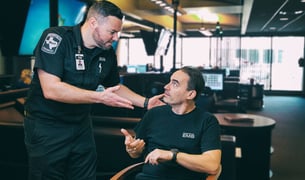Baker to Vegas: Leveraging Pulsara to Manage a Planned Event
Although they have the advantage of prior awareness and preparation, large-scale planned events pose unique challenges for emergency management...
5 min read
 Team Pulsara
:
Aug 21, 2020
Team Pulsara
:
Aug 21, 2020
![Building Effective Teams [Part 5]: Accountability and Results](https://www.pulsara.com/hubfs/staff-team-listens-1200x630.jpg)
EDITOR'S NOTE: Special thanks to Megan Wittmann for writing today's blog post. You can connect with her on LinkedIn. This is Part 5 of our blog series Building Effective Teams. Click here to check out parts 1-4.
COVID-19 has made a huge impact on daily life, both at home and at work. In the midst of a crisis like this, it’s more important than ever to work on building strong working relationships with your team. As we jump into discussing the last few elements of building an effective team, I want to tell a story about an emergency department nurse named Jen.
Jen has loved working in the emergency department at her local hospital for five years. Since COVID-19 surfaced in her community, there have been many changes at work. She spends her shifts covered in PPE, and worries if she will bring the virus home to her two small children. In addition to her normal schedule, her manager asked if she would represent the ED on a COVID-19 Regional Response Committee.

At the first committee meeting, Jen sat back and listened. She watched as others engaged in hot-tempered conversations, hesitant to speak in front of so many strangers. Silently, she wondered why she had agreed to participate. Exhausted from extra shifts and stress, the meetings didn’t seem worth the time and energy.
Her outlook changed in the next session, though, as she heard medics share about the struggles EMS was going through. Jen realized that no matter which organization or care team each person was a part of, everyone had two main goals in common: take care of patients and keep caregivers safe.
In the following days, the committee outlined their goals, and every member shared ideas and concerns. Jen took the plans back to her emergency department team, and spent hours helping the manager communicate with and train the ED staff. When one of her colleagues was upset over a process developed between medical command and the ED, she took the time to listen and work through the issue. Many colleagues complimented the work, but a few accused her of siding with “them”―the other agencies―and not being at the bedside when they needed her. Jen listened and shared what she had learned.

Within weeks, the emergency department had key performance indicators put in place. When processes were not followed as planned, Jen had to have some difficult conversations with fellow clinicians. There were many tweaks as time went by, based on suggestions from both her ED team and the regional committee.
Although COVID cases surged, the region has been able to provide adequate healthcare services, and do not believe any clinicians have been infected with the virus while at work. The task force is currently in discussion on how to celebrate the good work and plan for next steps.
Jen still worries about her family, and what is going to happen at the hospital in the next few months. However, by establishing new working relationships and strengthening old ones, she and her team are now better equipped to navigate through the uncertainty.

This story could have gone many ways. If Jen had chosen to handle things differently, the outcome might not have been quite as good. Considering the elements of building an effective team we’ve discussed previously, let’s look at a few “what-ifs”:
Defining the Team
What if Jen was so focused on only her normal emergency department team that she couldn’t shift her thinking to also being part of the regional team? She might not have been able to consider what clinicians from other organizations were going through, and wouldn’t have been as open to finding solutions that worked for everyone.
Trust
What if Jen came in with preconceived notions about the other organizations, and thought they were just trying to push the work to the emergency department? What if she hadn’t established trust within her current ED team? A lack of trust would’ve made her resistant to any solutions proposed by other organizations, or might’ve sabotaged the success of any solutions she brought back to her team.
Surfacing Conflict
What if Jen never spoke up and offered her emergency department perspective when she was involved in the regional team? What if she didn’t address colleagues with concerns? Taking the path of least resistance and avoiding conflict might’ve seemed easier at the time, but it would have ultimately hindered each team’s ability to come up with solutions that considered each person’s perspective and worked for everyone.
Commit to Decisions and Standards
What if Jen chose not to uphold the approach decided on by the regional committee, and didn’t take the time to communicate with and train the ED team? While it would’ve initially avoided tension over making changes, her emergency department team would have become frustrated by the lack of cohesive standards for COVID response, and likely would’ve gotten upset at the lack of clear communication about what guidelines they were supposed to follow.
Put in the context of effective teams, it’s easy to see how this story may have turned out quite differently.
To finish off this series, let’s discuss the last two elements: hold yourself and others accountable, and focus on collective results.
"Accountability separates the wishers in life from the action-takers that care enough about their future to account for their daily actions."
― John Di Lemme
Each team member plays an important role in the entire team’s success. If no one is held accountable for accomplishing their portion of the work, standards can slide, and team members might not feel motivated to contribute as much as they would otherwise. What if Jen didn’t role model the process or speak to colleagues when they didn’t follow the standards? Without consequences for not upholding standards, the changes Jen helped make wouldn’t have stuck.
 Accountability among your team starts with holding yourself accountable to the same standards. Take responsibility for the situation, and be willing to put in the work to make things right. You can assist your peers by offering support, and having honest conversations when there are challenges. And while you can help develop accountability within your team no matter what your position is, managers play an important role in creating a culture of accountability.
Accountability among your team starts with holding yourself accountable to the same standards. Take responsibility for the situation, and be willing to put in the work to make things right. You can assist your peers by offering support, and having honest conversations when there are challenges. And while you can help develop accountability within your team no matter what your position is, managers play an important role in creating a culture of accountability.
For more on building personal, team, and managerial accountability, check out these resources:
Though maintaining a culture of accountability isn’t easy to do with the pressures we face in our daily lives, small steps can make a big impact on your team’s ability to work together to achieve goals.
And now, for the final element of how to build an effective team. All of the previous elements build up to this one: focusing on results, and reaching the goals that your team has put forward.
When you first set out to make changes, you had a desired goal in mind. Keeping track of progress helps you see how you’re doing in achieving that result, shows you when to change course, and highlights the hard work the team has put forward to get there.

Going back to Jen’s story: What if the task force didn’t keep track of the impact their plans made on COVID-19 response? Would exhausted clinicians continue to tax themselves with the extra effort of implementing the changes? Not likely. If the results weren’t important, what was the point of making the changes?
Focusing on and following up with the end result is what makes changes worth the effort, and helps build a spirit of forward momentum with your team.
In order to help your team focus on collective results, it’s important to:
Throughout this series, we have just scratched the surface on what it takes to make a highly effective team. Not all of the steps are easy. In fact, a few of them are downright uncomfortable. As Jen’s experience shows, though, choosing to build trust, respect, communication, and accountability with your team will yield positive results and strengthen relationships within your team. Every small step in the right direction helps create a better care experience—for everyone involved. #ItsAboutPeople
“Be the change that you wish to see in the world.”
― Mahatma Gandhi
This concludes our series on Building Effective Teams. If you missed the first four posts, be sure to check them out here!

Although they have the advantage of prior awareness and preparation, large-scale planned events pose unique challenges for emergency management...

For Those Who Love a Good "Oopsie!" At Pulsara, we pride ourselves on enabling secure, HIPAA-compliant communication for healthcare teams. But let’s...

March Recap A New Integration: Improving Data Management, Streamlining Workflows, and Improving Care CoordinationOnly a few days ago, we announced...